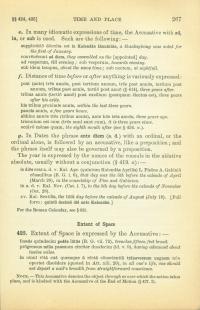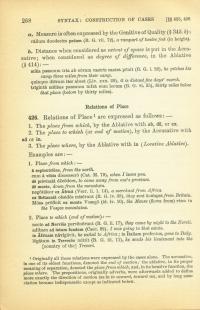425. Extent of Space is expressed by the accusative.
fossās quīndecim pedēs lātās (B. G. 7.72)
trenches fifteen feet broad
prōgressus mīlia passuum circiter duodecim (id. 5.9)
having advanced about twelve miles
In omnī vītā suā quemque ā rēctā cōnscientiā trānsversum unguem nōn oportet discēdere.
(quoted in Att. 13.20)
In all one's life, one should not depart a nail's breadth from straightforward conscience.
Note— This accusative denotes the object through or over which the action takes place and is kindred with the Accusative of the End of Motion (§ 427.2).
a. Measure is often expressed by the Genitive of Quality (§ 345.b).
vāllum duodecim pedum (B. G. 7.72)
a rampart of twelve feet (in height)
b. Distance when considered as extent of space is put in the accusative; when considered as degree of difference, in the ablative (§ 414).
Mīlia passuum tria ab eōrum castrīs castra pōnit.
(B. G. 1.22)
He pitches his camp three miles from their camp.
Quīnque diērum iter abest. (Liv. 30.29)
It is five days' march away.
trīgintā mīlibus passuum īnfrā eum locum (B. G. 6.35)
thirty miles below that place
(below by thirty miles)


